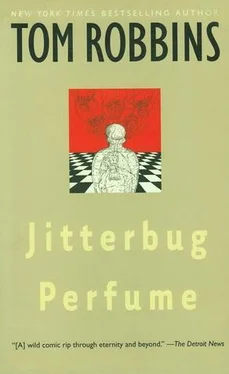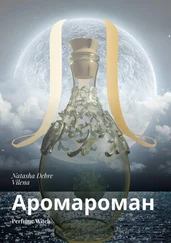In less than a day, he caught up with Kudra. She was squatting by the path relieving herself when he rounded the bend. She leapt to her feet in midstream and threw her arms about him.
“I knew you would follow me,” she said, with the kind of confidence some women exude when they sense that they have made a clean capture with the vaginal net.
“You left without a word,” he said. Her kiss, so wet and exotic upon his unpracticed Western lips, vented much of the steam from his accusation.
“I feared that you would talk me out of it. You have talked me out of several things already, including my widow's virtue and my obligation on the funeral pyre.”
“Praise Shiva,” he said mockingly.
“Praise Shiva,” she repeated, after a long pause, and with more than a hint of the poignant.
She still had not pulled up her boy's trousers, and Alobar kneaded her bare, piss-damp thighs. “You made it impossible for me to remain at Samye,” he said.
“Your stories of the Bandaloop made it impossible for me to remain there.”
“So, your destination was the caves.”
“My destination is the caves. And you are going with me.”
Any protest he might have uttered was drowned out by the fluttering of the pages of the Kama Sutra , dog-eared pages with notes in their margins, which she taught Alobar to read with his one oozing eye, the Kama Sutra being a book that usually opens in the middle and begins at the end.
When the volume had been wiped and placed back on the shelf, they again took to the path. Irrigated by snow-melt, the recently awakened grass on the slopes glittered like spinach between the teeth of the hard earth. Far below them, in deep, narrow gorges, streams worked themselves into a lather, roaring like all the seashells in the world turned inside out; and above, great cold peaks in mineral armor were trying to smash the sky. Step by step, the path led them down and away from this terrible beauty.
“I have been considering,” said Kudra, a tad out of breath, “what you said about desire.”
“Ah,” said Alobar. “And now you agree that the devotee's desire to be without desire is the most insidious desire of all.”
“Not exactly, Alobar. Look at it this way. The word desire suggests that there is something we do not have. If we have everything already, then there can be no desire, for there is nothing left to want. I think that what the Buddha may have been trying to tell us is that we have it all, each of us, all the time; therefore, desire is simply unnecessary.” She stopped to catch her breath. “To eliminate the agitation and disappointment of desire, we need but awaken to the fact that we have everything we want and need right now.”
Alobar thought, She is a smart one, smarter even than Wrenna, whom she resembles in odd physical ways. And her vulva is as clever as her speech. I was right to pursue her, though I must be careful that her power does not turn against me, and I must come between her and those sickening oils she likes to smear upon her flesh .
Aloud, he asked, “Do we have everything, you and I?”
They were descending into a small valley. The valley had clouds tipping into it, and the clouds were dark, as if bruised by the jagged thrusts of the peaks. One cloud was so black that Chomolungma herself might have battered it. The wind was at their heels and beginning to bark.
“I have lost my husband, my children, my people, my faith,” said Kudra. “Yet I feel that still I have everything. Everything, at least, that I deserve. Brrr. It is growing cold.”
“A storm is building,” said Alobar. “There is one thing we have not, and it is that thing we are obliged to desire.”
“And that is?” Kudra buttoned her vest against the first blown drops of gelid rain.
“Some influence over the unknown tribunal that sentences us to die against our wishes. A reform of that law that decrees death a certain consequence of birth.”
The wind had grown so strong it practically rolled them down the path. When Kudra said, “I cannot tell if that be the one valid desire or the greatest deception,” she had to yell to be heard. “Perhaps we shall have our answer from the Bandaloop.”
“The what?”
“The Bandaloo-oo-p.” The word sailed away on the wind, its vowels banging together and scattering, its consonants tearing the lips of the word like the bit of a runaway horse.
There proved to be no shelter in the valley, not even a boulder leaning at a protective angle, so Alobar and Kudra pressed on. Soon, they were regaining altitude. By nightfall, the rain had turned to snow, the last blizzard of the Himalayan spring. Should they continue to walk, they might topple into a gorge; should they stop, they might freeze. They walked, keeping to a pace just fast enough to promote circulation.
When dawn finally came, it was only a stain in the sky. Kudra prayed to Shiva and Kali, separately and together, and while looking for a signal from the gods that light was still on their payroll, she crashed into the trunk of a Yünnan pine that a gale had muscled into the presumed path. She had to sit in a drift until the pain subsided, Alobar draped over her like a human tent. The kneecap swelled up until it was as round as one of her breasts and as tight as a devil drum. She leaned against Alobar and, she hobbling and he shuffling, their bellies agonizing and their energy all but gone, they reentered the mainstream of the storm.
Within two hours, he was not so much supporting as dragging her. She was babbling about sandalwood groves, and marketplaces where crumbs of jasmine flower blew about the streets like music. Although his fingers were numb, he sensed them losing their grip on her.
“Please hold on. Kudra, please hold on. Please, Kudra, please, Kudra, please.”
The trail was descending again, but if his calculations were correct, they were yet two days from the foothills. Three days, if the weather didn't break. An eternity, if she couldn't get back on her feet.
“Please, Kudra. It won't be long. . ” He bit his blue lip against the falsehood. “It won't be long until we reach the caves.”
She wailed. The cry was so similar to the wails of the widow on the cremation fire that a huge horror seized him, a horror shot through with adrenaline, and he picked her up in his arms and began to run with her.
The horror changed into a kind of giddiness. This must look ridiculous , he thought, though to whom it looked ridiculous he failed to name. He must have meant Death, for in a minute he conceded, “Death has trapped us, that's for sure, but he shall not take us sitting still.” And, as the pageant of his life, no less ridiculous than this mad dash in the snow, flashed before him, he laughed and laughed.
Almost immediately the wind fell quiet, like a drunk who has passed out in the middle of a rage. The sun burned through and set about boiling clouds into dumplings, then into gravy.
With Kudra somewhat revived, they made the foothills in little more than a day. It was practically on their hands and knees that they covered the final mile. But nobody greeted them. The caves of the Bandaloop were empty and bare.
Alobar gathered wood and built a fire. In the process of drying their damp clothing, they slipped into unconsciousness and did not awake for hours. When his eyes did open, Alobar arose and remade the fire. He recognized some herbs not far from the caves, picked them and steeped a strong, green beverage in his bowl. After taking tea, they went to sleep again. This sequence was repeated numerous times, until upon a sunny morning, perhaps four days hence, they found themselves sitting in a cave mouth, wide awake and reasonably nourished.
Concluding his account of how he had swept her up and run with her, Alobar ventured the opinion that they had survived because he reached a point where he did not take his desire to live seriously. “My desire was no less than before, you understand, but I no longer identified with the desire. Perhaps that is why desire causes men calamity. By identifying with our desires and taking them too seriously, we not only increase our susceptibility to disappointment, we actually create a climate inhospitable to the free and easy fulfillment of those desires.”
Читать дальше












